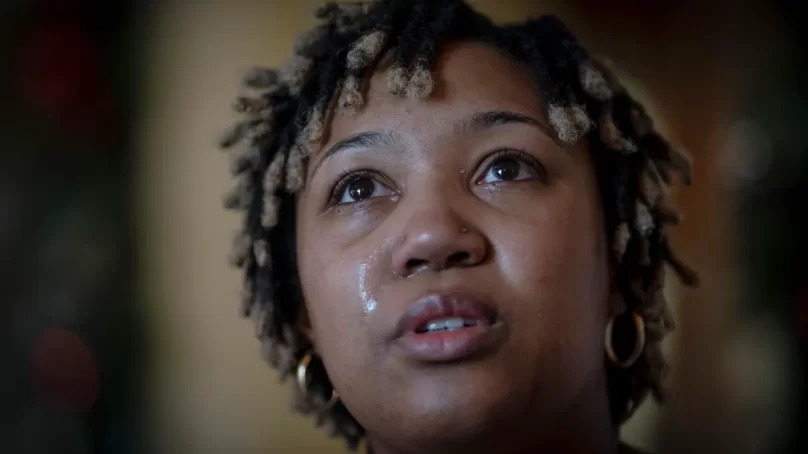
Angelica Lyons knew it was dangerous for Black women to give birth in America.
As a public health instructor, she taught college students about racial health disparities, including the fact that Black women in the US are nearly three times more likely to die during pregnancy or delivery than any other race. Her home state of Alabama has the third-highest maternal mortality rate in the nation.
Then, in 2019, it nearly happened to her. What should have been a joyous first pregnancy quickly turned into a nightmare when she began to suffer debilitating stomach pain.
Her pleas for help were shrugged off, she said, and she was repeatedly sent home from the hospital. Doctors and nurses told her she was suffering from normal contractions, she said, even as her abdominal pain worsened and she began to vomit bile. Angelica said she wasn’t taken seriously until a searing pain rocketed throughout her body and her baby’s heart rate plummeted.
Rushed into the operating room for an emergency caesarean section, months before her due date, she nearly died of an undiagnosed case of sepsis. Even more disheartening: Angelica worked at the University of Alabama at Birmingham, the university affiliated with the hospital that treated her.
Her experience is a reflection of the medical racism, bias and inattentive care that Black Americans endure. Black women have the highest maternal mortality rate in the United States – 69.9 per 100,000 live births for 2021, almost three times the rate for white women, according to the Centres for Disease Control and Prevention.
Black babies are more likely to die, and also far more likely to be born prematurely, setting the stage for health issues that could follow them through their lives.
“Race plays a huge part, especially in the South, in terms of how you’re treated,” Angelica said, and the effects are catastrophic. “People are dying.”
Angelica Lyons looking up with tears running down her cheeks. Angelica Lyons tears up while recalling her birthing experience during an interview in Birmingham, Alabama, on February 5, 2022.
To be Black anywhere in America is to experience higher rates of chronic ailments like asthma, diabetes, high blood pressure, Alzheimer’s and, most recently, Covid-19. Black Americans have less access to adequate medical care; their life expectancy is shorter.
From birth to death, regardless of wealth or social standing, they are far more likely to get sick and die from common ailments. Black Americans’ health issues have long been ascribed to genetics or behaviour, when in actuality, an array of circumstances linked to racism – among them, restrictions on where people could live and historical lack of access to care – play major roles.
Discrimination and bias in hospital settings have been disastrous.
The nation’s health disparities have had a tragic impact: Over the past two decades, the higher mortality rate among Black Americans resulted in 1.6 million excess deaths compared to white Americans.
That higher mortality rate resulted in a cumulative loss of more than 80 million years of life due to people dying young and billions of dollars in health care and lost opportunity.
A yearlong AP project found that the health challenges Black Americans endure often begin before their first breath. The AP conducted dozens of interviews with doctors, medical professionals, advocates, historians and researchers who detailed how a history of racism that began during the foundational years of America led to the disparities seen today.
Angelica Lyons appears as a blur holding her phone in one hand and son in another. In the background Angelica’s sister Ansonia Lyons sits on the kitchen counter eating from a bowl.
Angelica Lyons’ pregnancy troubles began during her first trimester, with nausea and severe acid reflux. She was prescribed medication that helped alleviate her symptoms but it also caused severe constipation. In the last week of October 2019, while she was giving her students a test, her stomach started to hurt badly.
“I remember talking to a couple of my students and they said, ‘You don’t look good, Ms Lyons,'” Angelica recalled.
She called the University of Alabama-Birmingham Hospital’s labour and delivery unit to tell them she was having a hard time using the bathroom and her stomach was hurting. A woman who answered the phone told her it was a common pregnancy issue, Angelica said, and that she shouldn’t worry too much.
“She made me feel like my concern wasn’t important, and because this was my first pregnancy, I decided not to go because I wasn’t sure and thought maybe I was overreacting,” Angelica said.
The pain persisted. She went to the hospital a few days later and was admitted. She had an enema – a procedure where fluids are used to cleanse or stimulate the emptying of bowels – to alleviate her constipation, but Angelica continued to plead with them that she was in pain.
“They were like, ‘Oh, it’s nothing, it’s just the Braxton Hicks contractions,'” she said. “They just ignored me.”
She was sent home but her stomach continued to ache, so she went back to the hospital a day later. Several tests, including MRIs, couldn’t find the source of the issue.
Angelica was eventually moved to the labour and delivery floor of the hospital so they could monitor her son’s heartbeat, which had dropped slightly. There, they performed another enema that finally helped with the pain. She also was diagnosed with preeclampsia, a dangerous condition that can cause severe pregnancy complications or death.
Then she began to vomit what appeared to be bile.
“I got worse and worse with the pain and I kept telling them, ‘Hey, I’m in pain,’” Angelica said. “They’d say, ‘Oh, you want some Tylenol?’ But it wasn’t helping.”
She struggled to eat dinner that night. When she stood up to go to the bathroom, she felt a sharp pain ricochet throughout her body.
“I started hollering because I had no idea what was going on,” she said. “I told my sister I was in so much pain and to please call the nurse.”
What happened next remains a blur. Angelica recalls the chaos of hospital staff rushing her to labour and delivery, putting up a blue sheet to prepare her for an emergency C-section as her family and ex-husband tried to understand what went wrong. She later learned that she nearly died.
“I was on life support,” recalled Angelica, 34. “I coded.”
She woke up three days later, unable to talk because of a ventilator in her mouth. She remembers gesturing wildly to her mother, asking where her son, Malik, was.
He was OK. But Angelica felt so much had been taken from her. She never got to experience those first moments of joy of having her new-born placed on her chest. She didn’t even know what her son looked like.
- An AP report











